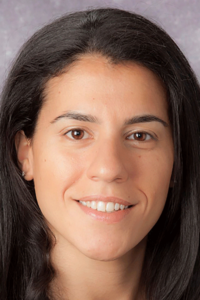Living with diabetes is challenging at any age.

“The speed of treatment, the intensity of treatment, the goals of treatment, all those things change based on where you are in the lifespan,” said Maisa N. Feghali, MD, one of four experts who will discuss Preserving Mental Health across the Lifespan of Living with Diabetes (and during COVID-19) at the Scientific Sessions. The two-hour session will begin at 8:00 a.m. ET on Sunday, June 27.
The early childhood years present unique developmental considerations independent of a chronic illness like diabetes, said Randi Streisand, PhD, CDCES, who will present recent findings about the stress of parents of young children diagnosed with diabetes and clinical strategies for promoting overall well-being in these children.
“Given that these little ones are going to have diabetes for a long time to come, it’s really important for families to set the stage for how they’re going to be managing diabetes down the road,” said Dr. Streisand, Division Chief of Psychology and Behavioral Health for the Center for Translational Research at Children’s National Hospital, and the Gerard B. Lambert Foundation Professor at George Washington University.
When children come into the clinic, the health care team should pay attention to not only the patient, but to the child’s support system, she added. At this stage, the mental health effects of diabetes are seen among caregivers more than in the pediatric patients.

“We need to do what we can to screen parents and then provide support to them,” Dr. Streisand said. “Because if they’re not doing all right themselves, they’re not going to be able to optimize their management of their child’s diabetes.”
As children develop, the way they interact with parents, health care providers, and even their disease changes. Jessica Pierce, PhD, a pediatric psychologist at Nemours Children’s Hospital, will discuss how providers can address the psychosocial needs of adolescents and young adults as they assume more responsibility for identifying their own support systems and incorporating diabetes self-care into their day-to-day lives—at home, at school, and eventually on the job.
This is a key component of the comprehensive care patients need to manage their diabetes effectively, said Dr. Pierce, who also is Research Scientist at Nemours Center for Healthcare Delivery Science and Associate Professor at University of Central Florida College of Medicine.
“Many adolescents and young adults with type 1 and type 2 diabetes experience depression, eating disorders, and other psychological concerns,” she added. “And so if we have a screening process in clinical care, we can make sure that the team understands what the patient needs.”
Dr. Pierce is conducting research that involves collaboration with young adults with type 1 diabetes, with the goal of developing strategies to keep this population engaged in research into young adulthood.

“Young adults are mobile. They’re moving, they’re going off to college, they’re changing addresses,” Dr. Pierce said. “So for the same reasons that keeping them involved in clinical care is challenging, keeping them involved in research studies that aim to improve that clinical care is also challenging.”
Dr. Feghali, Assistant Professor, Department of Obstetrics, Gynecology & Reproductive Sciences, University of Pittsburgh, will offer insights into managing the psychosocial challenges of diabetes during pregnancy. The goals of treatment and the engagement of patients differ significantly for women with gestational diabetes versus women with an existing diabetes diagnosis who become pregnant. This is due in part to the hurried pace of diabetes care during pregnancy. For women with type 1 or type 2 diabetes, the timeline of pregnancy care will span about 32 weeks from confirmation of pregnancy to delivery.
“For women with gestational diabetes, we’re talking about that diagnosis happening mostly just shy of a third trimester and you have about 10 to 12 weeks to teach someone about diabetes, initiate care, and create an impact,” Dr. Feghali said.
There is a clear, direct connection between a pregnant woman’s management of diabetes and her child’s lifelong risk of metabolic disease, she added. “Beyond just her own set of complications, there’s a whole other layer of complexity of all of her efforts and her treatment and her disease impacting the next generation,” she said.
The session’s final speaker, David G. Marrero, PhD, Director of the UA Center for Border Health Disparities at the University of Arizona Health Sciences, will discuss diabetes and mental health among the elderly population.
Register today for the 81st Scientific Sessions
If you haven’t registered for the 81st Scientific Sessions, register today to access all of the valuable content during the meeting, June 25–29. Registration also includes on-demand access to all of the virtual content in the Post-Meeting Archive, June 30–September 29.